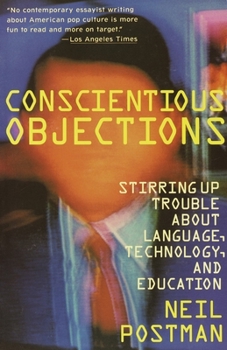Conscientious Objections: Stirring Up Trouble About Language, Technology and Education
Select Format
Select Condition 
Book Overview
In a series of feisty and ultimately hopeful essays, one of America's sharpest social critics casts a shrewd eye over contemporary culture to reveal the worst -- and the best -- of our habits of discourse, tendencies in education, and obsessions with technological novelty. Readers will find themselves rethinking many of their bedrock assumptions- Should education transmit culture or defend us against it? Is technological innovation progress or a peculiarly American addiction? When everyone watches the same television programs -- and television producers don't discriminate between the audiences for Sesame Street and Dynasty -- is childhood anything more than a sentimental concept? Writing in the traditions of Orwell and H.L. Mencken, Neil Postman sends shock waves of wit and critical intelligence through the cultural wasteland.
Format:Paperback
Language:English
ISBN:067973421X
ISBN13:9780679734215
Release Date:March 1992
Publisher:Knopf Doubleday Publishing Group
Length:224 Pages
Weight:0.58 lbs.
Dimensions:0.6" x 5.1" x 8.0"
Customer Reviews
2 ratings
Great introduction!
Published by Thriftbooks.com User , 17 years ago
Several of these interviews read like extended premises for Postman's other books (notably "Amusing Ourselves to Death" and "The Disapearance of Childhood") but that doesn't make them any less enjoyable. Sometimes, if you're reading a few essays, you'll get a bit confused as Postman changes his voice a lot through these essays. That's not a bad thing, but I fear that some people out there might not pick up on it and suspect that essays such as "The Naming of Bombs" are genuine and not humourous pieces. Its a great book and it really hooked me onto Postman.
A Great Introduction to Neil Postman
Published by Thriftbooks.com User , 26 years ago
This book contains essays and chapter excerpts from most of his other works (though not the later ones like Technopoly and The End of Education). Neil Postman is one of the keenest and most articulate of that species I call the "cultural hand-wringers". I'm very sympathetic to the arguments he makes, though sometimes I think he may be a bit too dire. I've read everything he's written that I can get my hands on, and all of it has been a total delight. (I'd steer any Postman fans to Robert Hughes _The Culture of Complaint_ for similarly keen, delightful, and refreshing take-no-prisoners denunciations) Since so much of his work is a complaint about how form (e.g. TV) has coopted function, I hardly think Postman himself would approve of this kind of recommendation, but he's so much fun to read even if you *don't* agree with him that it's worth the effort anyway. But watch out: he's so persuasive and passionate with his arguments, you'll probably end up doing so no matter how well-armed you are against it. Two essays that have stuck in my mind: "The German Question" where he ponders what the Holocaust consciousness will mean to postwar Germany, and "The Small Screen" where Postman is invited to write something nice about television for once.






